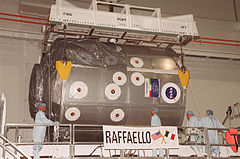Raffaello MPLM
 Raffaello being prepared for flight on STS-100 | |
| Operator | NASA |
|---|---|
| Website | NASA MPLM |
| Mission duration | ~2 weeks |
| Spacecraft properties | |
| Spacecraft | Raffaello |
| Spacecraft type | MPLM |
| Manufacturer | ASI |
| Dry mass | 4,082 kilograms (8,999 lb)[1] |
| Orbital parameters | |
| Reference system | Geocentric |
| Regime | Low Earth |
| Inclination | 51.7° |
| Berthing | |
The Raffaello MPLM, also known as MPLM-2, was one of three Multi-Purpose Logistics Modules which were operated by NASA to transfer supplies and equipment to and from the International Space Station. Raffaello was used for four of twelve MPLM flights to the space station, with Leonardo being used for the remainder. It was first launched on 19 April 2001, aboard the STS-100 mission flown by Space Shuttle Endeavour, and made its third flight in July 2005, aboard Discovery on STS-114. Raffaello's final flight was aboard Space Shuttle Atlantis on the STS-135 mission, the last flight of the Space Shuttle.
In April 2023, Raffaello was transferred to Axiom Space to be repurposed and flown as part of Axiom Station.[2]
Construction
[edit]Like the other Multi-Purpose Logistics Modules, Raffaello was constructed by the Italian Space Agency, who chose to name it after the painter and architect Raffaello Sanzio.[1] The module was constructed in the late 1990s, and delivered to NASA at the Kennedy Space Center in August 1999.[3]
Flights
[edit]
| Mission | Orbiter | Launch (UTC)[4] | Landing (UTC) |
|---|---|---|---|
| STS-100 | Endeavour | 19 April 2001 | 1 May 2001 |
| STS-108 | Endeavour | 5 December 2001 | 17 December 2001 |
| STS-114 | Discovery | 26 July 2005 | 9 August 2005 |
| STS-135 | Atlantis | 8 July 2011 | 21 July 2011 |
See also
[edit]References
[edit]- ^ a b "What is MPLM?". NASA Marshall Space Flight Center. Archived from the original on 27 May 2010. Retrieved 17 May 2010.
- ^ Leinfelder, Andrea (2023-04-27). "NASA's Super Guppy delivers space shuttle module for reuse on Axiom Space's commercial station". Houston Chronicle. Retrieved 2023-04-27.
- ^ "Multi-Purpose Logistics Modules". International Space Station. NASA. Retrieved 17 May 2010.
- ^ McDowell, Jonathan. "Launch Log". Jonathan's Space Page. Retrieved 17 May 2010.

